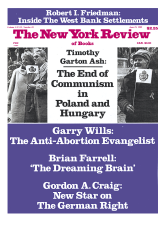In response to:
Black vs. White in Chicago from the April 13, 1989 issue
To the Editors:
I would like to correct some misstatements in Thomas Byrne Edsall’s article about Chicago politics [NYR, April 13]. He wrote, “Whatever the election, when there is a choice between a black and a white, each race chooses its own by margins exceeding ten to one.”
In fact black Democratic politicians from Chicago almost always receive the votes of an overwhelming majority of white Democrats when running against Republican opponents. Every black holding statewide, countywide or citywide office has been elected with the support of the vast majority of white Chicago Democrats. Examples include Illinois Comptroller Roland Burris, Cook County Commissioner John Stroger, Cook County Recorder of Deeds Carol Moseley Braun, Cook County Board of Appeals member Wilson Frost and Chicago Treasurer Cecil Partee. Similarly, white Democrats from Chicago ordinarily receive the overwhelming support of blacks when running against Republicans.
Edsall is also wrong when he suggests that racial divisions in mayoral elections are causing a revival of the Republican Party in Chicago. In fact the Republicans in Chicago are as weak as they ever have been. The Republican candidate for mayor this year received the lowest percentage of the vote in that party’s history. Not one of the 50 members of the city council was elected as a Republican.
Kevin Sweeney
Chicago, Illinois
Thomas Byrne Edsall replies:
In Chicago, the election that counts is the contest to pick the mayor, but in fact other elections do take place, and Mr. Sweeney correctly disputes my assertion that “whatever the election…each race chooses its own.” In city, county, and state elections, black Democratic nominees for posts other than mayor have received substantial white support. As my article points out, Harold Washington, before his death, joined with Democratic party chairman George W. Dunne to put together a successful biracial slate for the Cook County offices on the 1988 ballot. The sentence should have read: “In mayoral elections, when there is a choice between a black and a white, each race chooses its own by margins exceeding ten to one.”
I do, however, stand by the view that racial divisions in mayoral elections have caused a revival of the Republican party. Not only does Cook County now have a Republican sheriff, James O’Grady, but the GOP has taken over previously Democratic state senate seats in the northwest and southwest, each of which overlaps into the suburbs. There are few aldermen or committeemen in these districts who would dispute the suggestion that a black mayor in City Hall at the time of the state senate elections was critical to the outcomes. A similar pattern is emerging in presidential voting. In 1980, before the election of Harold Washington, Jimmy Carter lost Illinois statewide to President Reagan by eight percentage points, a bigger defeat than the two-percentage-point loss Michael S. Dukakis suffered at the hands of George Bush in 1988. Carter, however, carried forty-seven of Chicago’s wards, while Dukakis carried forty-two wards, with all the Democratic losses in white wards.
The high degree of racial polarization in mayoral contests results from the intense competition between the races for city services and jobs. Civil service and court rulings have restricted these mayoral powers, but Chicago remains a city where the voters see the mayor as empowered to determine within each neighborhood and precinct the quality of garbage collection, sidewalk repair, tree trimming, snow plowing, and all other city services, as well as to determine which race gets the lion’s share of jobs. For other offices, which the voters have not vested with such powers, there is a much greater willingness on the part of white Democrats to vote for black Democratic nominees, and a consistently high level of black Democratic support for white Democratic nominees.
This Issue
June 15, 1989



